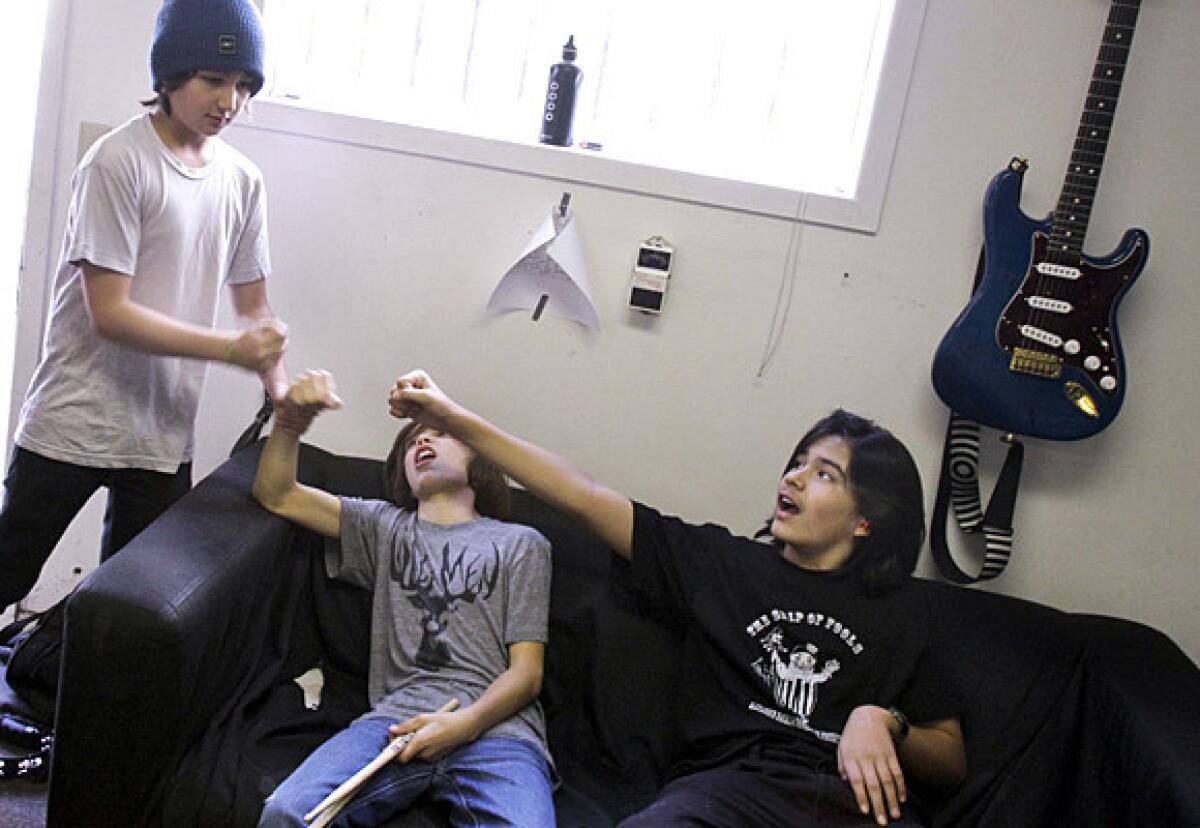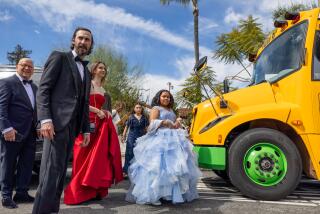At this school, kids get in trouble if they don’t turn up the music

Roll over Beethoven. At the School of Rock, studying the classics means learning the Ramones’ “Blitzkrieg Bop” and Pink Floyd’s “Another Brick in the Wall,” not “Moonlight Sonata.”
On Nov. 13, the nationwide chain of music schools opened its 60th location, in West Los Angeles, to teach 7-to-18-year-olds how to jam on guitar, bass, drums, keyboards and vocals. The Wilshire Boulevard outlet is the second area location for the school, joining the 4-year-old School of Rock in North Hollywood. And there may be more coming.
“Los Angeles can easily support three times as many schools as we have now,” says School of Rock Chief Executive Chris Catalano.
It has been a dozen years since Paul Green, apparently an inspiration for Jack Black’s character in the 2003 movie “School of Rock,” opened the first academy in Philadelphia. (Green left the company earlier this year and has started a music education program in rural New York for 18-to-25-year-olds.) In 2009, private investment firm Sterling Partners bought a majority stake in the Teaneck, N.J.-based company and has shifted the short-term focus to franchising schools. The West L.A. location is the last of the 22 company-owned schools scheduled, but franchise plans call for at least 300 new locations to open over the next five years in North America.
Regardless of the locale, the mission is the same: “We offer a musical sanctuary for kids who have a fire about music — a place for them to learn from professional musicians, not from professional full-time teachers,” says Carl Restivo, the music director for the North Hollywood and West L.A. schools.
Restivo isn’t just playing the part of a wannabe rocker. The songwriter-guitarist-producer is in Tom Morello’s Street Sweeper Social Club, has worked with Rihanna and Wyclef Jean, and co-wrote a song on the multi-platinum “Twilight” soundtrack. He’s far from the only rocker on the roster: Teachers at the North Hollywood location include Al Pahanish Jr. from Powerman 5000, Tracey “Spacey T” Singleton from Fishbone, Pablo Sebastian from Malbec and Jody Delli Santi from Supercreep.
The L.A. schools bring out the famous parents too. Producer and former Eurythmic Dave Stewart’s two younger daughters have taken classes at the North Hollywood school. He likes the discipline that studying music requires. “People think rock music is just a lot of people jamming and having fun, but when you break down how did Pink Floyd make this particular track, some parts of it are almost mathematical.”
Stewart is so taken with the School of Rock concept that he and Catalano are talking about launching a program that teaches students how to make a living as a musician. There are also discussions about a reality show, as well as possible franchises in Stewart’s native England.
At School of Rock, kids who have never picked up an instrument start with Rock 101, which comprises a weekly 45-minute private lesson and 90-minute group jam. On a recent Saturday, three pint-sized players, all with furrowed determination, noisily thrashed through – what else? -- Deep Purple’s “Smoke on the Water” in the Zappa Shack, a stand-alone guest cottage at the North Hollywood location.
In the main house, the advanced kids ran through private instruction in the school’s six lesson rooms, all named after famous musicians, including Eddie Van Halen, Keith Moon and John Bonham. They also participate in a three-hour weekly rehearsal. The cost is $350 per month.
After 12 weeks of lessons, the students are cast in a rock show — don’t call it a recital — held at a local club, like the Whiskey or the Mint, that focuses on a particular artist’s repertoire. One of last season’s performances featured Led Zeppelin’s “Physical Graffiti” and “Houses of the Holy.”
On this Saturday, Brian Rector’s 13-year-old son, Waylon, who studies bass and guitar, is in one lesson room, while Brian’s 16-year-old daughter, Chloe, bashes the drums in another. The best part, Brian Rector says, is “the satisfaction [they get] from performing before live audiences and the feeling of achievement. They just want to get better at everything all the time.” Rector would love for his children to become professional musicians but admits that his wife has different ideas. He looks at his 10-month-old daughter, Soraya, who’s standing with daddy’s help, and says, “She’s going to be a doctor.”
Waylon Rector, along with other top players from the North Hollywood and Vista, Calif., schools, often perform at area events such as the School of Rock All Stars. On Oct. 26, they played “School’s Out” and “We Will Rock You” on ABC’s “ Dancing With the Stars.”
All Stars bassist Max Bouvrie, who studies at the North Hollywood school, worried about smudging “the make-up the lady put on me” before the ABC taping but afterward was all smiles. “School of Rock puts a huge emphasis on respect,” the 15-year-old says. “When someone else is talking, you don’t play. When someone else is playing solo, you step back.... All these things blatantly play a role on stage, but even more so in the real word. It’s how you should act in school or when you walk down the street.”
The new West L.A. site resides in a one-story, stand-alone stucco structure, shadowed by office towers due west of the Wilshire Corridor. Daniel Leanse, the executive director for the Westside school, is a former New Christy Minstrel who was most recently the cantorial soloist at Village Temple in New York City. “I coached hundreds of kids for B’nei Mitzvah,” says Leanse, who studied at Boston’s Berklee College of Music and has always kept a hand in the secular music world. “When I saw School of Rock, I thought, I’ve had all this fun and success teaching kids something they don’t really want to do; how much fun would it be to teach them to play rock ‘n’ roll?”
With budget cuts slashing into music programs, the School of Rock has unintentionally found itself fulfilling an instructional role once provided by public schools. “We’re trying to find ways we can be more integrated into the schools around our schools because we think it’s the logical thing to do,” Catalano says. The School of Rock also hopes to formalize some kind of scholarship program. “There should be a way for kids who can’t afford us to get the same experience. We have a commitment to the shareholders, but also to the community.”
More to Read
The biggest entertainment stories
Get our big stories about Hollywood, film, television, music, arts, culture and more right in your inbox as soon as they publish.
You may occasionally receive promotional content from the Los Angeles Times.






